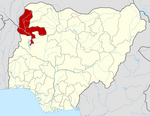Gwandu: Difference between revisions
Jump to navigation
Jump to search
Content deleted Content added
mNo edit summary Tags: Reverted Visual edit Mobile edit Mobile web edit |
rv replacement of sourced content with unsourced content |
||
| Line 61: | Line 61: | ||
|website = |
|website = |
||
|footnotes = |
|footnotes = |
||
}} |
|||
}} Gwandu is a historical city and emirate located in what is now Kebbi State, Nigeria. It was one of the major political and cultural centers of the Sokoto Caliphate, which was established in the 19th century by Usman dan Fodio. Gwandu served as the capital of the Gwandu Emirate, one of the prominent emirates within the Sokoto Caliphate. |
|||
'''Gwandu''', also called '''Gando''', is a [[town]] and [[emirate]] in [[Kebbi State]], [[Nigeria]]. The seat of government for the [[emirate]]<ref>{{Cite journal|last=Balogun|first=S. A.|title=Succession Tradition in Gwandu History, 1817-1918|date=1973|url=https://www.jstor.org/stable/41856982|journal=Journal of the Historical Society of Nigeria|volume=7|issue=1|pages=17–33|jstor=41856982|issn=0018-2540}}</ref><ref>{{Cite journal|last=Jimoh|first=Mufutau Oluwasegun|date=2017-05-01|title=Gwandu Emirate: The Domain of Abdullahi Fodiyo, Since 1805|url=https://go.gale.com/ps/i.do?p=LitRC&sw=w&issn=08886601&v=2.1&it=r&id=GALE%7CA517879823&sid=googleScholar&linkaccess=abs|journal=Journal of Pan African Studies|language=English|volume=10|issue=3|pages=386–390}}</ref> and district of this name is in [[Birnin Kebbi]], which is the capital of Kebbi State and was capital of the historical [[Kingdom of Kebbi]].<ref>{{Cite book|last=Balogun, Saka Adegbite.|title=Gwandu emirates in the nineteenth century with special reference to political relations, 1817-1903|date=1970|oclc=38630457}}</ref> Founded in the sixteenth century by the Kabbawa, a [[Hausa language|Hausa-speaking]] people, Gwandu today acts as one of the four emirates composing Kebbi State.<ref>{{Cite journal|title=GWANDU|doi=10.1163/_eifo_sim_2570}}</ref> |
|||
The town became important during the [[Fulani War|Fulani jihad]], and from 1815 it was one of the two capitals of the [[Sokoto Caliphate|Fulani empire]]<ref>{{Cite book|last=Hopen|first=C. Edward|url=https://books.google.com/books?id=ORBqDwAAQBAJ&q=gwandu&pg=PT49|title=The Pastoral Fulbe Family in Gwandu|date=2018-09-03|publisher=Routledge|isbn=978-0-429-95044-5|language=en}}</ref> until it came under British control in 1903.<ref>{{Cite book|last=Tukur|first=Mahmud Modibbo|url=https://books.google.com/books?id=5DvsDAAAQBAJ&q=gwandu&pg=PT52|title=British Colonisation of Northern Nigeria, 1897-1914: A Reinterpretation of Colonial Sources|date=2016-08-15|publisher=Amalion Publishing|isbn=978-2-35926-048-9|language=en}}</ref><ref>{{Cite web|url=https://www.britannica.com/place/Gwandu-Nigeria|title=Gwandu {{!}} Nigeria|website=Encyclopedia Britannica|language=en|access-date=2019-03-20}}</ref><ref>{{Cite journal|title=GWANDU|doi=10.1163/_eifo_sim_2570}}</ref> |
|||
Under the Sokoto Caliphate, Gwandu became an important administrative and military center. It played a crucial role in the expansion and governance of the caliphate's territories. The Gwandu Emirate was ruled by an emir who served as a political and religious leader, overseeing the affairs of the region. |
|||
Gwandu was known for its strong Islamic heritage and scholarship. It was home to prominent Islamic scholars, theologians, and jurists who contributed to the intellectual and cultural development of the Sokoto Caliphate. Islamic education flourished in Gwandu, with the establishment of schools and centers of learning. |
|||
During the British colonial era in the early 20th century, the Sokoto Caliphate and its emirates, including Gwandu, came under British control. The emirate system continued to exist, but with reduced political power. Gwandu remains an important historical and cultural center, preserving the legacy of the Sokoto Caliphate and its contributions to Nigerian history. |
|||
Today, Gwandu is a thriving city in Kebbi State, with a mixture of modern infrastructure and historical landmarks. The Gwandu Emirate continues to exist, with the emir serving as a traditional and cultural leader for the local community |
|||
until it came under British control in 1903. |
|||
==References== |
==References== |
||
Revision as of 22:44, 13 May 2023
This article needs additional citations for verification. (February 2016) |
Gwandu
gwandu | |
|---|---|
LGA and town | |
| Nickname: TA ABDULLAHI | |
| Motto(s): land of farmers and readers | |
| Coordinates: 12°30′8″N 4°38′33″E / 12.50222°N 4.64250°E | |
| Country | |
| State | Kebbi State |
| Time zone | UTC+1 (WAT) |
Gwandu, also called Gando, is a town and emirate in Kebbi State, Nigeria. The seat of government for the emirate[1][2] and district of this name is in Birnin Kebbi, which is the capital of Kebbi State and was capital of the historical Kingdom of Kebbi.[3] Founded in the sixteenth century by the Kabbawa, a Hausa-speaking people, Gwandu today acts as one of the four emirates composing Kebbi State.[4]
The town became important during the Fulani jihad, and from 1815 it was one of the two capitals of the Fulani empire[5] until it came under British control in 1903.[6][7][8]
References
- ^ Balogun, S. A. (1973). "Succession Tradition in Gwandu History, 1817-1918". Journal of the Historical Society of Nigeria. 7 (1): 17–33. ISSN 0018-2540. JSTOR 41856982.
- ^ Jimoh, Mufutau Oluwasegun (2017-05-01). "Gwandu Emirate: The Domain of Abdullahi Fodiyo, Since 1805". Journal of Pan African Studies. 10 (3): 386–390.
- ^ Balogun, Saka Adegbite. (1970). Gwandu emirates in the nineteenth century with special reference to political relations, 1817-1903. OCLC 38630457.
- ^ "GWANDU". doi:10.1163/_eifo_sim_2570.
{{cite journal}}: Cite journal requires|journal=(help) - ^ Hopen, C. Edward (2018-09-03). The Pastoral Fulbe Family in Gwandu. Routledge. ISBN 978-0-429-95044-5.
- ^ Tukur, Mahmud Modibbo (2016-08-15). British Colonisation of Northern Nigeria, 1897-1914: A Reinterpretation of Colonial Sources. Amalion Publishing. ISBN 978-2-35926-048-9.
- ^ "Gwandu | Nigeria". Encyclopedia Britannica. Retrieved 2019-03-20.
- ^ "GWANDU". doi:10.1163/_eifo_sim_2570.
{{cite journal}}: Cite journal requires|journal=(help)

